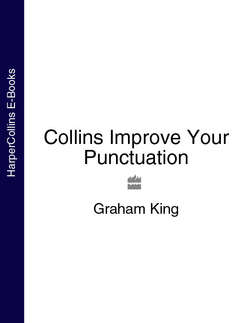Читать книгу Collins Improve Your Punctuation - Graham King - Страница 16
The Comma Weight Reduction Plan
ОглавлениеPiling on commas is as easy as putting on calories; in both cases the problem is getting rid of them. And if we do decide to slim, let’s not go over the top. Here’s an exercise in comma reduction, starting with a simple sentence that’s gained a little too much weight:
| A | My hobby, trainspotting, is, to many, a joke. |
| B | My hobby, trainspotting, is to many, a joke. |
| C | My hobby, trainspotting, is to many a joke. |
| D | My hobby trainspotting, is to many a joke. |
| E | My hobby trainspotting is to many a joke. |
Pedants might claim that all five sentences differ in nuances of meaning, but to the average reader they all mean the same thing. So we are left with choosing which one is fit and lean enough to express our thought clearly, economically and elegantly. Which version would you choose? (our choice would be C, but it is our personal preference and not one we would wish to impose on others.)
The ability to recognise where commas are needed and where they are not may be an acquired skill but it is worth pursuing. Merely scanning a sentence will usually tell you. The writer of the following sentence was either afraid of commas or intent on speed of delivery:
The land is I believe owned by the City Council.
Most of us would place commas before and after the phrase I believe because it is an important qualifier; it needs to be highlighted from the main statement, The land is … owned by the City Council which, without the qualification, may or may not be true:
The land is, I believe, owned by the City Council.
A more serious lapse occurs when the lack of commas leads to ambiguity. A well-known illustration of this involves the fate of a young warrior in Ancient Greece who, on the eve of departing for a war, consults the Oracle at Delphi. Thou shalt go thou shalt return never by war shalt thou perish, he was told breathlessly. Mentally placing the commas after go and return, the warrior leapt on his chariot with brimming confidence. Unfortunately he was killed in the first battle without realising that what the Oracle meant was, Thou shalt go, thou shalt return never, by war shalt thou perish. Two commas could have saved his life.
One of the most common instances of the ‘dropped comma’ occurs when we write or utter the phrase ‘No thanks’ – without separating or mentally separating the two words with a comma. What we really mean is ‘No (I decline), thanks’ (but thank you all the same); what we are in fact saying is ‘No thanks!’ – which if you think about it is nothing less than a rude rejection!
As a general rule, where dropping a comma doesn’t endanger understanding but instead helps the flow of the sentence, leave it out.
